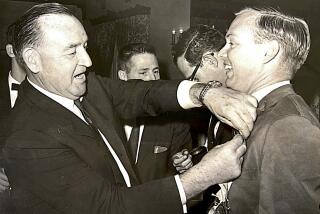Trading up
LIKE MOST COMPROMISES, the trade agreement reached Monday between South Korea and the United States doesn’t entirely please anybody. If it is approved by Congress, some would win and others would lose. But two things are near certain: There would be more winners than losers -- and among the biggest beneficiaries would be the state of California. And the state’s congressional delegation should know that.
The deal, which would be the United States’ biggest trade pact since the North American Free Trade Agreement in 1992, still must go before Congress and the South Korean National Assembly. It faces trouble in both places, in part because of lame-duck presidents whose free-trade policies face heavy legislative opposition.
President Bush is facing a fight against House Democrats who are pushing for more labor and environmental protections in trade deals (the Korea pact scarcely mentions such issues). Also in the opposition camp are ranchers -- because the deal doesn’t lift Korean restrictions on imports of U.S. beef -- and automakers, who think Korean carmakers will benefit more than they will. That means representatives of Michigan and farm states can be expected to oppose the pact.
No such unity can be expected from California legislators. Yet the importance of trade to their home state -- especially trade with Asia, which has made the ports of Los Angeles and Long Beach the biggest port complex in the nation -- cannot be underestimated.
The last time the U.S. negotiated a trade deal approaching this size, the most prominent members of the California delegation were divided. Sen. Dianne Feinstein voted in favor of the Central American Free Trade Agreement in 2005, while Sen. Barbara Boxer, her fellow Democrat, opposed it. Also against the deal was Nancy Pelosi, the San Francisco Democrat who is now speaker of the House. None of the three have yet said how they will vote on this deal, but their leadership could prove crucial.
The deal’s benefits to California are clear. Its lowering of agricultural barriers would be a boon for citrus growers. Hollywood would be among the biggest winners because the deal opens South Korea to American TV programming, toughens copyright protections and relaxes ownership restrictions on Korean production companies. South Korea already accounts for $20.7 billion in two-way trade through the ports of L.A. and Long Beach, the No. 3 nation by volume -- and under the deal, trade between the two countries is expected to jump by up to a third within a few years. Even the lowering of U.S. barriers to Korean cars, so displeasing to Detroit, is good for Southern California because the U.S. headquarters of Korean auto giant Kia is in Irvine.
If California’s members of Congress want to show they represent the interests of their state, they should strongly back this trade deal.
More to Read
Get the L.A. Times Politics newsletter
Deeply reported insights into legislation, politics and policy from Sacramento, Washington and beyond. In your inbox three times per week.
You may occasionally receive promotional content from the Los Angeles Times.










